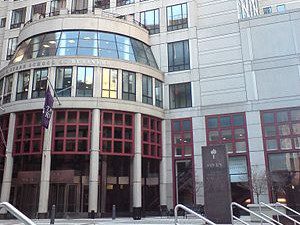Admissions Tip: Deadlines

Anyone who’s familiar with the MBA application process knows that August moves forward at an accelerated pace, and come September, entire weeks seem to disappear. To help this year’s Round One applicants avoid the classic time crunch, today’s blog post offers some basic advice on how to approach the Round One MBA deadlines at a reasonable pace.
Let’s start by taking a quick look at a handful of the earliest deadlines for the top MBA programs:
September 6: Harvard Business School
September 8: Cambridge / Judge
September 12: Duke / Fuqua
September 13: Yale SOM
September 15: London Business School
September 19: Stanford GSB, Penn / Wharton, Notre Dame / Mendoza (Early Deadline)
September 20: Northwestern / Kellogg, INSEAD
September 21: Chicago / Booth, Berkeley / Haas
September 25: MIT Sloan
September 29: Oxford / Saïd
For a full list of deadlines, check out Clear Admit’s post here.
Though some schools have yet to announce their deadlines (such as UMD Smith and UCI Merage, one can still get a sense of the lineup of R1 deadlines. Here are a few tips to keep in mind when creating your personal timeline.
Plan to be busy in August.
Yes, it can be tempting to work on one’s tan instead of one’s essays. However, many MBA applicants squander the month of August only to wake up in September and realize that they cannot make their target deadlines. If you are not bogged down by professional obligations in August, this makes for a great opportunity to devote time to working on your MBA applications in the evenings. The last weeks of summer can easily be split between résumé drafting, essay writing, recommendation coaching, GMAT prep, school research, and more.
Think carefully about the timing of the R1 MBA deadlines.
Looking at the deadlines above, it becomes clear that some deadlines may be easier to make than others. A candidate applying to Haas and London Business School could have a leisurely October when compared to someone targeting Haas, London Business School and NYU Stern (Oct. 15, 2017 Round 1 Deadline). Assuming about three weeks of research and writing for each school’s application, take a look at the deadlines and count backwards to determine a start date for each. It is entirely possible to meet back-to-back deadlines, such as Tepper and Darden, but doing so requires a well-planned schedule and consistent progress.
Consider taking some time off from work.
We realize that many MBA applicants work 70 hours per week and haven’t had a day off in months. For such applicants, a day or two out of the office can really do wonders for focus and organization. Applying to business school is a serious undertaking, and in the long term you won’t regret having given yourself enough time to prepare strong applications. Many successful candidates take a week off in early September to make the final push. It’s not a glamorous way to spend your vacation time, but an offer to attend a leading MBA program can make the sacrifice well worth it.
Get your recommenders on board early.
While some of the schools have not yet made their online applications and recommendation forms available, it’s a good idea to engage your recommenders early and inform them about the process and your timeline. Sit down with each recommender, perhaps over lunch or coffee. Present them with an outline of the deadlines and the process. It’s then a wise idea to meet again once the forms are available, and by that time many applicants are in a position to share their background materials (a résumé, career goals essays, etc.) to help their recommenders understand—and support—their message.
Happy planning!
This article has been edited and republished with permissions from Clear Admit.
Applying for an MBA During Undergrad: Schools Step Up

Deciding to attend business school isn’t a spur of the moment decision. For most applicants, it’s a choice made after months, if not years, of research and consideration following their undergrad degree. And, according to the 2016 MBA.com Prospective Students Survey by the Graduate Management Admission Council (GMAC), these considerations can begin quite early for some prospective MBA students.
The survey found that on average, millennials apply to graduate management programs within 14 months of considering such degrees – a significantly shorter timeline than members of Generation X (21 months). Further, the 2016 Application Trends Survey Report found that 46 percent of full-time MBA programs target undergrad students in their outreach efforts. With more applicants applying to business school relatively early in their careers, a number of leading business schools are offering pre-business programs for college students considering an MBA.
Pre-MBA Business Programs
The Tech Summer Institute at the Anderson School of Management is a six-week program for UCLA undergraduate students who are interested in business careers. With a combined focus on the tech industry and management, the program aims to help students more clearly envision what their future careers could look like.
Students in the program have the opportunity to learn from instructors with backgrounds as directors, consultants and CEOs, strengthen their teamwork and presentation skills through group programs and company visits, and learn from HBS case studies detailing solutions to real-word business problems. Participants are also able to learn about the graduate experience from a panel of Anderson MBA students.
During the program, students live on campus in summer housing. Students have a choice between two tracks:
- Track 1—Communication and Persuasion for Future Leaders in Technology: for students most interested in developing their communication skills across oral and written platforms.
- Track 2—Data Management and Analytics, Big and Small Data: for students interested in learning how to interpret and analyze data to make sound business decisions.
“Overall, I really enjoyed this program and found it extremely rewarding,” said Grace Nguyen, a Psychology major. “Not only was I introduced to a variety of business concepts, but I was able to fully understand how business and technology interact. This program has provided me with tools, which I will carry with me into my career.”
UCLA Anderson isn’t the only school with a business prep program for undergraduate students. Stanford University’s Graduate School of Business offers a similar opportunity with their Stanford MBA Future Leaders Program. This three-day program aims to introduce college students from a diverse set of backgrounds and schools to the benefits of an MBA education and post-MBA career opportunities. Students in the program live on campus, participate in a case study, visit top companies in the Bay Area, and attend an MBA Bootcamp. The reasoning behind the program is simple: exposure.
“I certainly believe that many people only aspire to what they have been exposed to,” Simone Hill, a Stanford MBA admissions officer and the program’s staff director told Clear Admit. “It is hard for someone to be a computer software engineer if they don’t know what a computer software engineer is. We believe the exact same thing in terms of people thinking about an MBA and, specifically, a Stanford MBA.”
Finally, the Tuck School of Business at Dartmouth College has a unique Business Bridge Program. While more than half of 2016 participants were rising juniors and seniors, this program is also open to recent graduates and other professionals.
The program is offered three times a year — twice over the summer and once during the winter — and is three to four weeks long, depending on the session. It’s meant to give students with humanities, STEM, and social science backgrounds an opportunity to gain a competitive edge by learning fundamental business skills.
Tuck Bridge participants live on campus for an immersive experience similar to the Tuck MBA. After the Bridge Program, attendees go onto careers in business, and some return to Tuck to earn their MBAs.
“Bridge helped me realize that an MBA program would be an important part of my career development, and that Tuck was where I wanted to make that happen,” said Daniel Torres, Bridge ’07 & Tuck ’11, Senior Financial Analyst at Wizards of the Coast. “Everything that impressed me about the school during Bridge has held true in the full-time MBA program.”
Deferred Admissions Programs
Deferred admissions programs are another option for undergraduate students thinking about applying for an MBA. These programs offer a safety net of sorts by allowing undergraduates to apply for an MBA program while still in college, but then to defer their actual enrollment until they’ve completed a year or two of work.
Two such programs are Harvard Business School’s 2+2 Program and the University of Virginia’s Darden School of Business Future Year Admissions Program.
The Harvard 2+2 Program is a deferred admissions process for current undergraduate students or students enrolled in a full-time masters program. Upon graduation, students admitted into the 2+2 Program spend a minimum of two years working in a professional position, and then begin the two-year HBS MBA program after they’ve gained the required real-world experience.
“Having the flexibility to try out a career path, knowing you have already been admitted to business school, is a fortunate place to be,” Stephanie Kaplan, a 2+2 participant told U.S. News. “It gives you the freedom to take risks, without much risk at all, since the worst thing that happens is that your current venture flops and then you enroll in Harvard Business School.”
The Future Year Admissions Program at the Darden School is similar to 2+2 at HBS. Students are accepted into the Darden MBA program either during the final year of their undergrad or Master’s. Then, they go on to complete two, three, or four years of professional work experience before enrolling. It’s a more flexibly timed program where students only have to plan to embark on their MBA in “a future year.”
Many Paths to an MBA
Each of these programs aims to support students in acquiring the skills and information they need to make the most of the MBA experience. Between summer primer courses for undergraduates and deferred admissions programs, business schools are responding to college student interest in graduate management education.
If you’re a college student or recent grad thinking about an MBA, check out our blog post for some advice: “Admissions Tip: Applying to Business School as a Younger Applicant.”
7 Takeaways from the 2018 U.S. News Business School Ranking

The schools making up the top 10 in this year’s U.S. News & World Report ranking of the nation’s best MBA programs—released today—were exactly the same as last year. That said, there are a smattering of surprises in terms of how top schools rose and fell relative to one another—and in movement among schools outside of the top 15.
At quick glance, here are this year’s top 10, in order of their 2018 rank (2017 rank in parentheses):
1 Harvard Business School (1)
1 University of Pennsylvania’s Wharton School (4)
3 University of Chicago Booth School of Business (2, tie)
4 Stanford Graduate School of Business (2, tie)
4 MIT Sloan School of Management (5, tie)
4 Northwestern’s Kellogg School of Management (4, tie)
7 UC Berkeley Haas School of Business (7)
8 Dartmouth’s Tuck School of Business (8, tie)
9 Yale School of Management (8, tie)
9 Columbia Business School (10)
With today’s release, students, alumni and administrators at Harvard Business School (HBS) can toast their school’s third consecutive showing at the top of the list. But the University of Pennsylvania’s Wharton School has even more cause for celebration, having tied HBS for first this year. It’s only the second time in 28 years it has claimed the No. 1 spot. It’s also an important rebound for the Philadelphia school, which fell to fourth last year as it was surpassed for the first time ever by the University of Chicago Booth School of Business.
Chicago Booth isn’t letting up, though. It took third place this year after tying Stanford for No. 2 last year. After never having cracked the top three before, Booth’s now done it two years in a row.
Perhaps the biggest news among the top 10—and the farthest fall from grace—was Stanford Graduate School of Business (GSB)’s slide into a three-way tie for fourth place with MIT Sloan School of Management and Northwestern’s Kellogg School of Business. Stanford has never before not clocked in at least third or above in the U.S. News ranking.
Rounding out the top 10 were Haas, Tuck, Yale and Columbia—very similar to last year except that Yale slipped slightly, from a tie at eighth with Tuck to a tie this year at ninth with Columbia. It’s a slight gain for CBS, meanwhile, which last year was 10th, behind Tuck and Yale in a tie for eighth.
7 Key Takeaways from the 2018 U.S. News MBA Ranking
We’ve sifted through the data and compiled a summary of things worth taking notice of this year:
1) Wharton Is the Year’s Big Winner
Wharton has traditionally been considered part of the “holy trinity” of schools, behind only HBS and Stanford in many people’s eyes. That made last year’s fourth-place finish behind Chicago Booth a real blow.
This year, the school fought back—seizing a shared claim to first place for only its second time ever. Strong employment and pay figures—85.6 percent of graduates employed at graduation and the highest reported average salary of all schools, $155,058—helped significantly.
“This is excellent news for Wharton—especially after last year’s showing in the U.S. News ranking and, more broadly speaking, in light of the constant (and not always positive) media attention the school has garnered due to controversial alum, President Trump,” says Graham Richmond, Clear Admit’s co-founder. “While many will quip about employment figures and how they favor the likes of HBS and Wharton vs. Stanford, the key—from Wharton’s perspective—is being squarely back in the ‘trinity,’” adds Richmond.

Booth School of Business
2) Booth Stakes Its Claim in the Top Three
Last year, Chicago Booth tied Stanford for second place—its first time ever outranking Wharton and also the first time the Chicago school had secured a top-three spot in the history of the U.S. News rankings.
Making it into the top three for a second year in a row helps dispel any notions of last year being a fluke. A climbing GMAT average (726) and high employment numbers (84.9 percent employed at graduation) have played a part in its rise.
3) Methodology Disadvantages Stanford
Because U.S. News’ methodology relies on “grades” from corporate recruiters and other employment stats that favor larger firms over startups or entrepreneurial pursuits, schools with large numbers of students going into tech startups or entrepreneurship—such as Stanford—are essentially penalized. Stanford may be further hurt—at least in terms of the U.S. News list—by the fact that its graduates are confident enough that they’ll land a plum job that they can be a little choosier about which offers they accept. Indeed, only 62.8 percent of its MBAs were employed by graduation—as compared to 85.8 percent at Wharton, 84.9 percent at Chicago Booth and 79.3 percent at HBS.
Of course, Stanford came out ahead in terms of average GMAT/GRE scores (737), average undergraduate GPA (3.73) and overall student selectivity. With an acceptance rate of just 6 percent, it was by far the most selective school of all those ranked, with HBS accepting 10.6 percent, Wharton, 19.6 percent, and Chicago Booth, 23.6 percent. But these factors are given less weight than peer assessments and corporate recruiter survey scores as U.S. News crunches its data.
4) Yale SOM Defends Its Position in the Top 10
This year marks the third time since 2013 that Yale School of Management (SOM) has ranked in the top 10, giving the school an increasingly legitimate claim to membership in this elite club. In this most recent ranking, the New Haven school tied for No. 9 with CBS. Last year it tied at eighth with Tuck—a five-spot jump over the previous year.
Yale has been making improvements on several fronts. In 2011, the school hired Dean Edward Snyder—the very same dean who sat at the helm of Chicago Booth during its meteoric rankings rise in the early 2000s. Yale has also been poaching high-profile faculty from other schools over the last decade, including Andrew Metrick, professor of finance, and Anjani Jain, current assistant dean, both formerly Wharton faculty.
Add to that the opening of glittery new facilities in 2014 and the school’s traditional strength and reputation as a leader in the non-profit and corporate responsibility areas—currently in vogue with millennials—and the school’s continued top-10 showing makes sense.
5) Columbia Regains a Spot, Sort of
CBS is battling to maintain its top-10 claim, and its tie this year with Yale for ninth is theoretically an improvement over its 10th place finish last year. But it’s still down from the No. 8 spot it successfully defended from 2012 through 2016. Contributing factors could include the rising cost of living in New York and declining interest among applicants in the financial sector—but that’s just conjecture.
As we noted last year, CBS is one of only a few schools in the top 10 that haven’t recently unveiled a new building or substantially expanded their facilities, which could be a liability. Construction is underway for an impressive new Manhattanville campus, but its projected completion date has been pushed off from the original 2018.
Yale’s moving into—and remaining in—the top 10 has also exerted downward pressure on CBS.
6) NYU Stern Gets Its Scores in on Time, Bounces Back from 20 to 12
Last year’s biggest shock was NYU Stern’s plummet from No. 11 to No. 20. But as U.S. News noted at the time, the reason for Stern’s sharp decline was the fact that it didn’t get its GMAT/GRE scores in on time. When it did get the scores in, U.S. News refused to recalculate the rankings.

NYU Stern
The drop of nine spots on the list did seem harsh—and pretty implausible. Indeed, this year’s No. 12 showing seems much more legit for the traditionally top-15 school—suggesting it got its scores in on time this year.
Again, Clear Admit’s Graham Richmond weighs in: “Last year’s NYU Stern/U.S. News rankings fiasco did not paint U.S. News in the best of lights. It felt like a petty slap on the wrist aimed at Stern and served to raise questions about the validity of the rankings, which were arguably no longer accurate where a key school was concerned. While it is nice to see things seemingly back to ‘normal’ this year, the issue highlighted the perils of a straight ordinal ranking that some suspect can be tweaked to sell magazines, rather than a tiered ranking that represents the true matriculation behavior we see among applicants seeking an MBA.”
7) Movers and Shakers Elsewhere in the Ranking
Of course, there are many business schools beyond the top 10. U.S. News ranked 131 schools in total. Further down in the rankings you see some more precipitous gains and losses. On the plus side, Arizona State University’s W. P. Carey School of Business and USC’s Marshall School of Business both cracked the top 25. Carey jumped 10 places to 25th, from 35th last year. Marshall moved up seven spots to come in just ahead of Carey at 24th.
The University of Virginia’s Darden School of Business slipped three spots to 14th, it’s second consecutive year of decline. Vanderbilt’s Owen School of Management also took a hit, dropping from 22nd to tie with Carey at 25th. Falling out of the top 25 altogether was Rice University’s Jones Graduate School of Business, which dropped to No. 29. This, despite its 11-spot leap to eighth place in Bloomberg BusinessWeek’s November 2016 ranking.
This article has been edited and republished with permissions from Clear Admit.
The Top 10 Business Schools Where MBAs Leave With A Job

U.S. News & World Report has just unveiled its findings on the best business schools in the country for MBAs to earn a job upon graduation.
